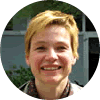Project team
 Mirjam Egli Cuenat
Mirjam Egli Cuenat (coordinator)
Switzerland |
 Kristin Brogan
Kristin Brogan
Ireland |
 Chantal Muller
Chantal Muller
Belgium |
 Anna Czura
Anna Czura
Poland |
Josephine Cole (UK) (2010-2011)
Anna Szczepańska (Poland) (2010-2011)
Associated members:
Lukas Bleichenbacher (PHSG, Switzerland)
Katharina Höchle (PHSG, Switzerland)
Barbara Wolfer (PHSG, Switzerland) (2010-2011)
A network of practitioners/participants of the Central Workshops (2011 and 2014)
Institutional partners
- University of Teacher Education St. Gallen, Switzerland
- Österreichisches Sprachen-Kompetenz-Zentrum (ÖSZ), Austria
- Swiss Competence Centre for exchange and mobility, Switzerland
- Haute Ecole de Namur, Belgium
- Institute of Technology Tralee, North Campus, Ireland
- University of Wrocław, Poland
Associate ECML projects
- A Framework of Reference for Pluralistic Approaches to languages and cultures (CARAP/FREPA)
- Language Associations and Collaborative Support (LACS)
- ECML publications for plurilingual and intercultural education in use (PIU)
- Languages in corporate quality (LINCQ)